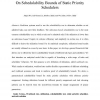Free Online Productivity Tools
i2Speak
i2Symbol
i2OCR
iTex2Img
iWeb2Print
iWeb2Shot
i2Type
iPdf2Split
iPdf2Merge
i2Bopomofo
i2Arabic
i2Style
i2Image
i2PDF
iLatex2Rtf
Sci2ools
RTAS
2005
IEEE
2005
IEEE
On Schedulability Bounds of Static Priority Schedulers
—Real-time systems need to use the schedulability test to determine whether or not admitted tasks can meet their deadlines. The utilization based schedulability test is the most common schedulability test, in which a task can be admitted only if the utilization is lower than an utilization bound. Despite its extreme efficiency and simplicity in on-line use, it is often difficult to derive the utilization bound. For its analytical complexity, utilization bound results are usually obtained on a case-by-case basis. In this paper, we develop a general framework that allows one to effectively derive schedulability bounds of different task types and schedulers. We first introduce an analytical model that is capable of describing a wide range of tasks and schedulers’ behaviors. We then propose a new definition of utilization, called workload rate. While similar to utilization, workload rate enables flexible representation of different scheduling and workload scenarios and leads to uniform...
Real-Time Technology | RTAS 2005 | Schedulability Bound | Schedulability Test | Utilization Bounds |
Related Content
| Added | 25 Jun 2010 |
| Updated | 25 Jun 2010 |
| Type | Conference |
| Year | 2005 |
| Where | RTAS |
| Authors | Jianjia Wu, Jyh-Charn Liu, Wei Zhao |
Comments (0)

